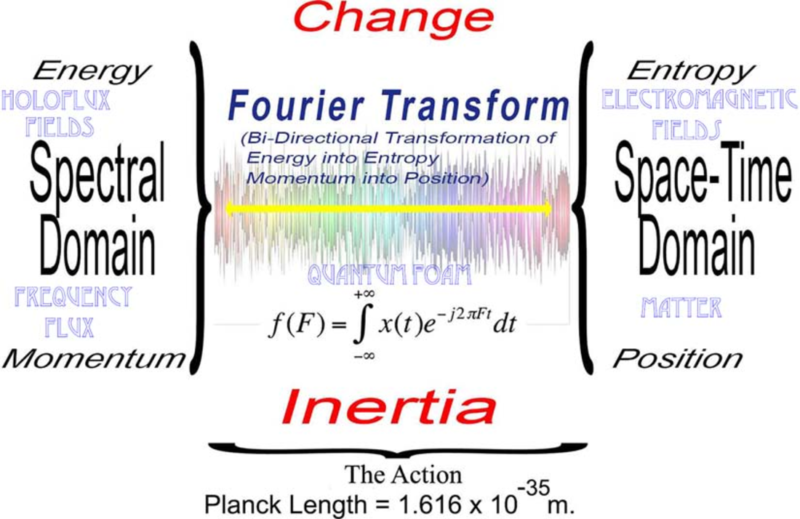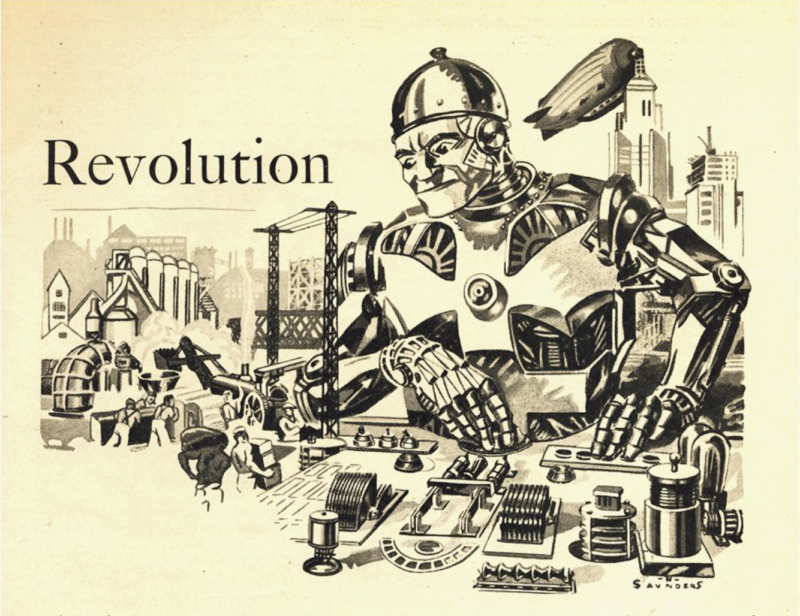
Why the Technocratic Mindset Produces Only Misery and Failure
MARK E. JEFTOVIC - bomb thrower
It has the most fundamental aspect reality backwards
Saw this article come across, come across my news alert for “Transhumanism”. In it Dr. David Eagleman talks about how not only can we augment human senses with fantastic new abilities (like to “see” heat and electromagnetic patterns), but how we’ll even be able to build machines that think too.
There is a line in his thinking that one can glean from the article: on one side of the line are enhancements and augmentations to the human experience which are startling and amazing and which will transform our societies: even more radical life extension will be in the cards quite soon (for those who can afford it).
Like I told Steve Bannon when we talked Transhumanism: For all intents and purposes we already have radical life extension. In the years of the Roman Empire, average life expectancy was between 18 and 25 and most people would die before age 11, from something like diarrhea. This was just normal and nobody thought it would ever change.
Where Eagleman crosses into technocratic thinking is when he veers into the idea of being able to build thinking machines. The logic is that because we’ll be able to increasingly bioengineer our own living bodies, it means we should also be able to bioengineer a mind into machines using the same principles.
I think this is wrong and it’s the same theoretical mistake that leads directly to technocratically inspired catastrophes.
Yes, we continue to build on technological advancements, but we also commit a lot of unforced errors that inflict incalculable misery on humanity. These errors may manifest as policy blunders, economic crises and worse. Most recently, for example, we seem to have gotten ourselves into a global pandemic because a bunch of technocrats funded some gain-of-function experiments in hopes of preempting the next pandemic. Do you see the dynamic here?
Over the years a lot of thinkers have pointed out that technoractic policy tracks, devised by centralized groups of experts within an elite managerial class, often bring about the very conditions they were impaneled to obviate. Raising minimum wages increases unemployment, holding interest rates to zero creates economic instability and increases wealth inequality, forcing green energy initiatives creates systems with lower energy efficiency and higher carbon footprints

Banning guns increases gun violence, censoring “hate” speech fosters more hatred and polarization. It’s almost as if the managerial class has no awareness of second-order effects. When they inexorably come to pass they are often blamed on the very people who were counselling against the initial policy in the first place.
Thus, financial meltdowns are blamed on runaway free markets and capitalism gone wild. Global warming (if it truly plays out along prognosticated lines) is blamed on industries who are most rapidly transitioning toward greener energy anyway (like Bitcoin mining).
Climate change is another theme that exemplifies the technocratic dynamic: As a society we’re going to transition off of fossil fuels no matter what anybody thinks about the environment because we’re already past peak oil, and peak demand will probably flatline around 100M bpd and start coming down from there in a secular downtrend, for a variety of reasons (prolonged economic malaise and the ascent of green energy).

Yet the most viable pathway toward transitioning away from fossil fuels, nuclear (and in this I include Thorium), is currently relegated as problematic by technocrats and ideologues.
It all seems backwards and for a long time I’ve been positing a fundamental root cause of this backwardation. I’ve settled on something I’ve talked about before, but now I think I didn’t fully realize how fundamental this key point is. When I sat down to resume work on my forthcoming book about Techno-Utopianism and Transhumanism I tried to write around it and avoid it. But I realized I couldn’t. It is so core to the overall technocratic mindset and it’s so controversial that I have to caveat it before I say it:
The caveat is that I don’t identify as a Christian or even a religious person per se. But I’m not an atheist either, and I’m not even agnostic. What I’m about to say is derived from my own understanding of scientific inquiry, not theological.
The premise is that what we have the mind/matter equation completely backwards in the way we think about how the world works.
Conventional thought is that what we experience as consciousness is something that emanates from the brain. Like steam from a kettle. This is also the core assumption of AI. If we build something that resembles a brain, it’ll think. It’s a kind of Frankenstein approach that Eagleman alludes to in his article.
That won’t work and AI will never be achieved as long as the mechanistic, material reductionist worldview persists. Yet, technocrats put a lot of faith in AI, and they think models derived from AI are or will be superior to anything we can figure out on our own because they were outputted by machines with a bigger/faster/hardware brains.
It is completely… wrong.
I think that what we experience as matter are energy patterns that emanate from an underlying, and conscious sub-strata of reality. This is basic quantum theory. Quantum theory can be problematic because it opens the door to all kinds of New Age Woo Woo, which may not even be entirely wrong at its core, but is prone to deeply flawed implementations (like anything, I guess).
People, and probably most living things, have a sense, an intuitive awareness of this sub-strata of reality. Our mythology and sacred texts are probably the stories of sometimes being more attuned to it and sometimes less so. The late British writer Colin Wilson wrote at length on the consciousness of the Egyptians of the upper kingdom, possibly over 7500 years BC. Their consciousness and language was pictorial not linear. It may even be possible (my extrapolation, not his) that the demarcation point between conscious awareness between individuals was blurred somewhat. Almost like the canine packs of Vernor Vinge’s Tines in ‘Fire Upon The Deep’.
Owen Barfield completely rejects the conventional idea of how our language evolved, that we started with “Ug ug” and developed from there. He thinks we had that pictorial awareness, a communications protocol unimaginable to us now, that in effect condensed downwards into linear language. This is a microcosm of the tension between how the technocratic mindset views everything as complexity arising from simple, mechanistic building blocks and a more informational / probabilistic / patternist view of reality.
Jean Gebser mapped the evolution of consciousness itself in The Ever Present Origin and today people like Ken Wilbur talk about how these different modalities of consciousness don’t supplant each other, like a linear development, but rather layer atop each other in a progression where each layer integrates those below it. At least the one we’re at today, the integrative consciousness, does so.
My guess is in earlier days, a type of spiritual wonderment would have arisen from these glimpses of the underlying force. What I’ve grown to call “The Great Externality” because I was trying to describe it in non-religious terms. Maybe it’s more of a Great Sub-Carrier. Think if it like “dialtone of reality”. Spiritual philosophers like Alan Watts said the entire point of all life was that the universe was physically manifesting in order to experience itself. He wasn’t the first, obviously, its a variation of a theme that has been recurrent throughout all recorded history, and possibly even before.
So what happened?
Into this awareness came religions. Organized structures that would begin to dictate the basis on which members of society were to comprehend and approach this Great Sub-Carrier. Priesthoods evolved – the first monopolies. Religions. Hierarchies. Rulers. Subjects.
One of the earliest forms of social deviance was heresy: approaching the Divine Sub-Carrier from a direction outside the religious structure. Can’t have that.
This dynamic is as old as humanity. It could even be argued that historical progress is the story of the public coming to realize that the monopoly thought structure they were in was flawed or obsolete and then society moving on to the next one. The elites of the day would endeavour halt the progression or when that failed, co-opt whatever came next.
Then new elites would erect a new orthodoxy that placed them directly in the nexus of what was unknowable and what the rabble thought they needed to know in order to perform their primary function of ….servitude.
Today the great sub-carrier is best described by science, not religion. But again, the priesthood is saying that all knowledge of the sub-carrier should come through them. That’s Scientism. That’s Technocracy. Management by Experts.
The last two years of life on earth are a foretaste of a full blown technocracy. Follow The Science™, plebes.
Only our elites can fathom how to approach and extract knowledge from The Great Externality, but this time they’ve made things even worse because they have it exactly backwards. They think the Great Externality doesn’t even exist. It’s for flakes and Bible bangers. The technocratic priesthood holds that material reality is near completely understood and that our minds are side effects of chemical reactions in our brains.
They hold that if only we can crunch enough Big Data and calculate out all the models we’ll be, like God (who doesn’t exist), able to fix everything and eliminate all bad outcomes, for everybody, everywhere. We may even be able to eliminate death, and we could upload our consciousness (which is an illusion) into the cloud and live forever.
Because of this backwardation, we will always be careening from one catastrophe to the next, and most of them will be of our own making. We collectively suffer from an illusion that we are in control.
But we are not in control. We’re a pattern. A dance. A cycle. Waveforms. Vibrations. What we as humans do specifically well, which is our superpower and has led to our technological advancement which could conceivably continue on a trajectory that makes humanity an interstellar phenomenon, is adapt.
What technocrats can’t understand, or admit is that we can’t control what is going to happen. Either on an individual scale of people thinking in ways they’re not supposed to think, or geological, cultural, geopolitical or cosmic scales. We can’t get interest rates right, we can’t get everybody to agree on whether it’s “Gif” or “jif” and somehow we’re going to change the trajectory of the climate? Achieve immortality? Crank out a Singularity?
That is highly unlikely and in trying to preempt theoretical bad outcomes we typically bring about horrible actual outcomes. The lab leak from the Wuhan Institute of Virology, if it occurred and it is looking increasingly likely that it did, was the result of gain-of-function studies on bat coronaviruses. They didn’t do it as a bioweapon. It’s not a global conspiracy to institute a Great Reset (all that talk is opportunism more than planning).
They were trying to figure out how to plan for a future global pandemic that may catch humanity off guard and cause incalculable damage. What did they accomplish? They unleashed a global pandemic that caught humanity off guard and caused incalculable damage. Soon to be compounded by global, de-facto compulsory inoculations with experimental vaccines that have a distinctly politicized impetus behind them.
That same dynamic is applied to economics (its where the .COM crash and Global Financial Crisis came from), and social policy (the Woke movement), to climate is all the same technocratic mindset that doesn’t understand the order of reality (mind, then matter) but even worse thinks it knows it.

We’re stuck with that for awhile because the technocratic mindset is incapable of introspection or entertaining the possibility of being wrong about anything. The only move it knows is to double-down on failure.
The antidote to all this is massive decentralization on a global scale, which has the added benefit that decentralization by definition, is not something that gets decided from the top (it never is). It just happens, even in spite of the people in the centre of power who may feel something about their gravitas melting away.
That’s what has started to happen. A global opt-out. The Great Reject. As sure as the Reformation gave way to the Enlightenment despite the protestations of the Church, we’re headed into a world of networks and the sunset of nations. All the while the propagandists of the old order shrieking that in this direction lies certain doom.
The Enlightenment arose from an increase in the level of abstraction, structurally the universe changed from the Ptolemaic worldview (the world as the centre of all existence) to the Heliocentric solar system.
Now we’re experiencing a similar shift away from static top-down hierarchical structures as the natural shape of civilization and toward shifting, impermanent, overlapping networks. My guess is the beginnings of quantum mechanics, over 100 years ago was the setting the table for the wider realization that we don’t live in a ping-pong ball universe where consciousness is an epiphenomenon of the brain. Rather that reality is an intersection of probabilities and information between what David Bohm called The Implicate and Explicate orders.

When AI researchers turn their attention toward building something that more closely resembles a transceiver that taps into that sub-carrier of reality, they’ll have a shot at making something that actually thinks.
To receive future posts in your mailbox join the free Bombthrower mailing list, follow me on Twitter, or use the current weakness in cryptos to take advantage of my Crypto Capitalist Portfolio trial offer.

